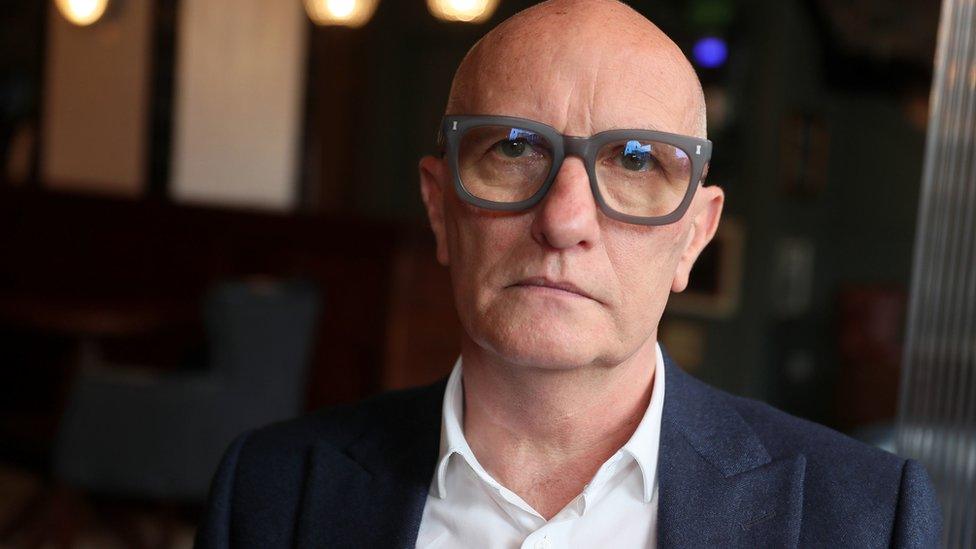NI buses and trains cancelled due to strike action
- Published
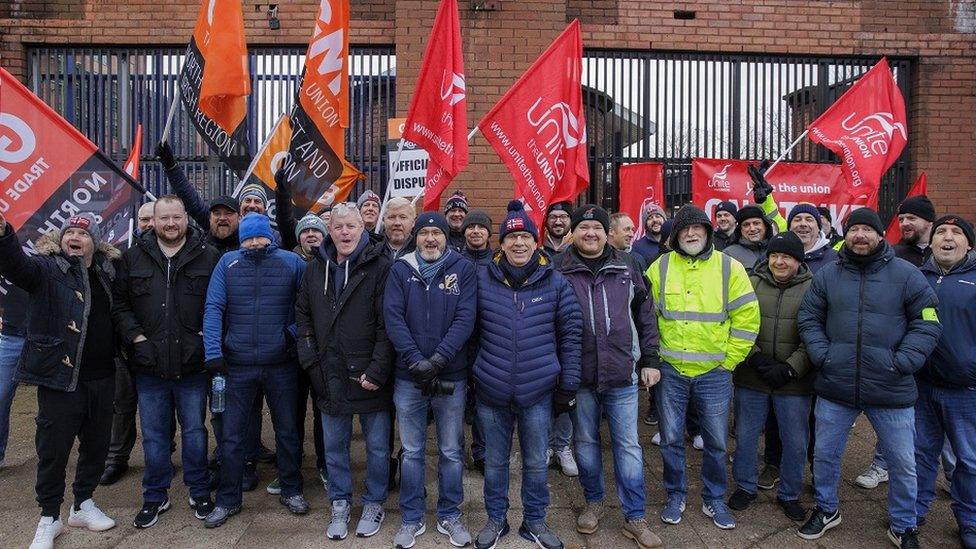
Striking workers on the picket line at Translink's Europa Bus Station in Belfast on Friday
A union representative has blamed NI Secretary Chris Heaton-Harris for strike action across the public transport network on Friday.
"He is engaged in a form of economic warfare with the people of Northern Ireland," Niall McNally from Siptu said.
A 24-hour strike that began at midnight Thursday caused extensive disruption.
Unite, GMB and Siptu union members voted in favour of the strike over what they have described as a "pay freeze".
It affected Ulsterbus, Metro, Glider and Goldliner services, along with train services and school buses.
A separate 24-hour pay strike by school support workers, including other bus drivers not employed by Translink, coincided with Friday's wider public transport strike.
'Significant disruption'
The action caused significant disruption to school transport on Friday; the Education Authority (EA) said more than 57,000 children and young people had been affected.
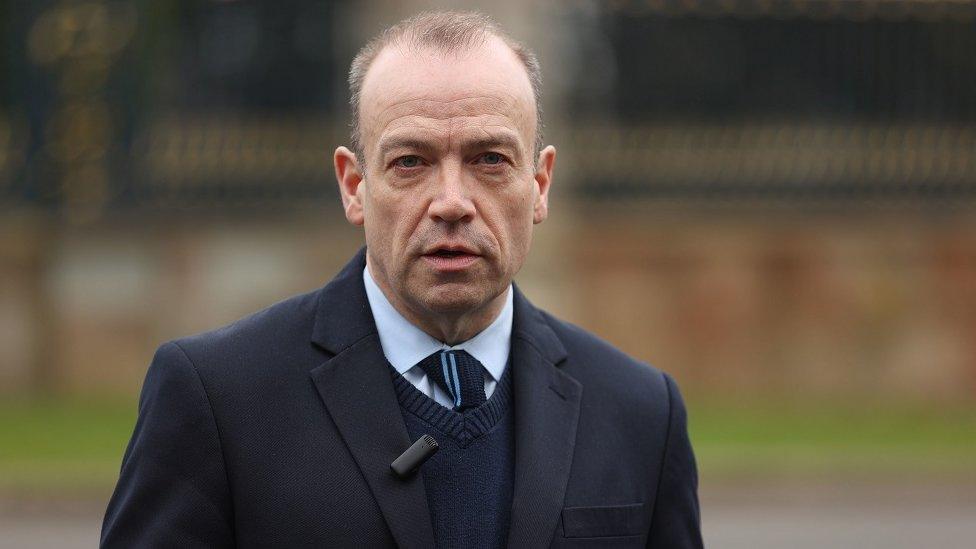
Union representatives have held Chris Heaton-Harris responsible for the strike
Translink has said it cannot make a pay offer at this time.
It said that was because in the budget allocation from Mr Heaton-Harris, Translink "did not receive a budget for a pay offer from the Department for Infrastructure".
'Last resort'
GMB regional organiser Peter Macklin described the strike action as "a last resort" but said "members have been offered no alternative".
"The secretary of state must intervene now to improve funding for public transport services so that public transport workers can receive a cost-of-living pay increase," he said.
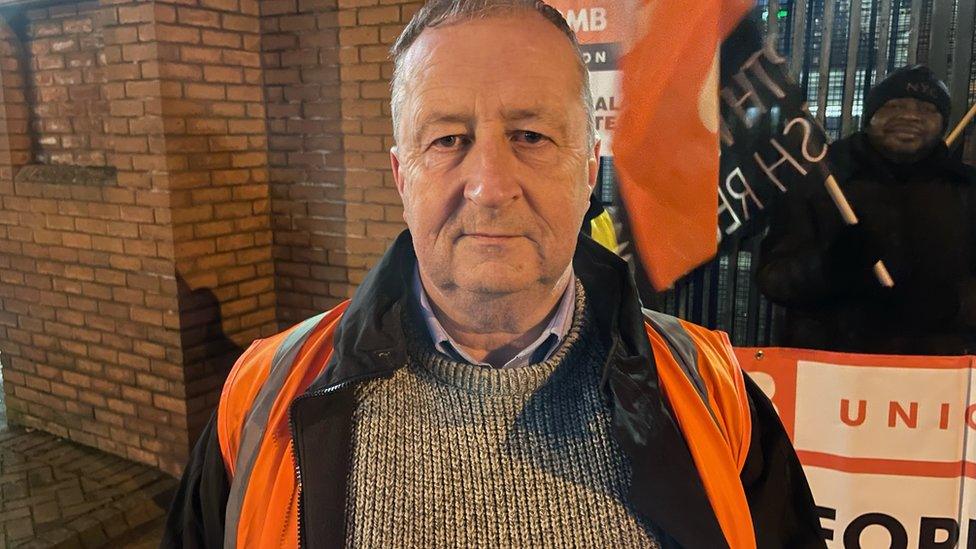
Union representative Peter Macklin described the strike as "a last resort"
Siptu's Mr McNally said that if further disruption in the lead-up to Christmas was to be avoided, the secretary of state must "reverse his approach".
Speaking to BBC's Evening Extra programme, he accused Mr Heaton-Harris of "acting like a political arsonist with the finances of Northern Ireland".
"He is engaged in a form of economic warfare with the people of Northern Ireland in a political game to try and leverage the DUP back into power," he said.
The Democratic Unionist Party (DUP) has boycotted Northern Ireland's power-sharing institutions in protest against post-Brexit trade barriers between the Northern Ireland and Great Britain.
'Crunch point'
When asked if he accepted Mr Heaton-Harris's position that public transport is a devolved matter, Mr McNally said: "We can't have this narrative that he can't do anything."
The secretary of state should drop his "austerity budget" which has "essentially [handcuffed] the departments in their ability to resolve this", he added.
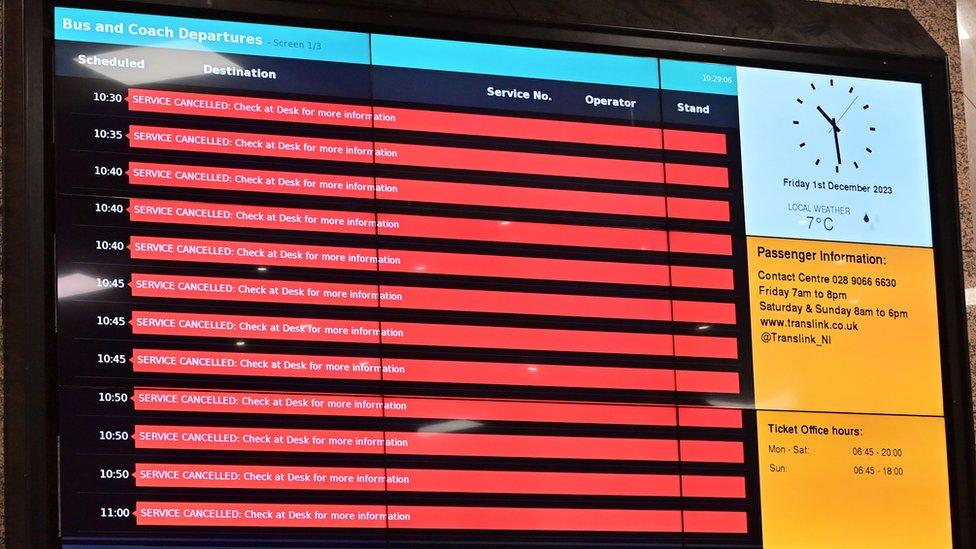
Bus and rail services across Northern Ireland have been cancelled
Unite deputy regional secretary David Thompson told BBC's Good Morning Ulster programme that "frustrations are starting to boil over".
"[Striking] is a big decision. It's over eight years since there's been a strike in our public sector," he said.
"Unfortunately, it has come to this crunch point."

On the ground: Cormac Campbell, BBC News NI reporter in Newry
In provincial towns, it is perhaps the schools that are feeling the impact of transport strikes more than businesses.
In Newry, there are seven post-primary schools and the Southern Regional College.
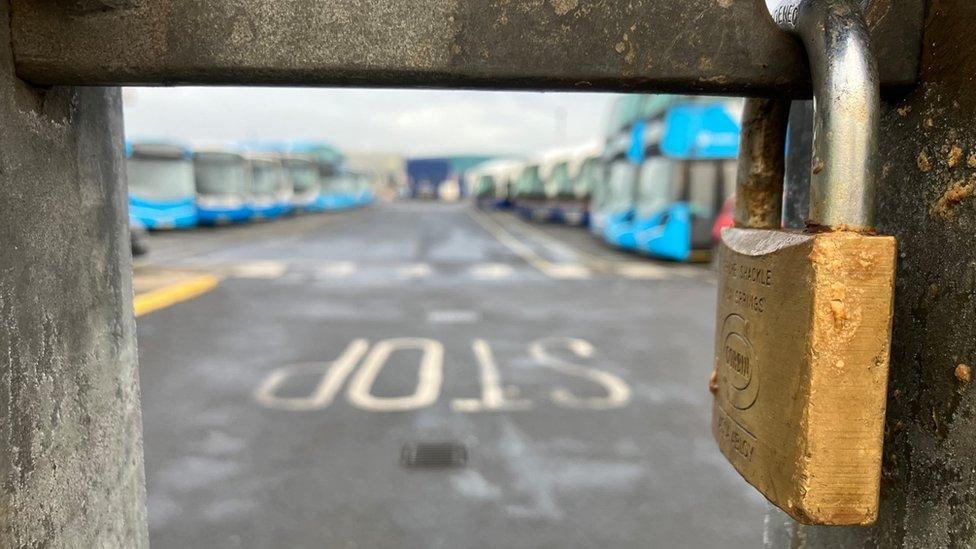
Newry bus depot was under lock and key on Friday
This means every day, thousands of students travel into the city from right across south Down and south Armagh - that's Kilkeel to Crossmaglen.
Staff at two of those schools have confirmed that about 60% of students were able to make their way into the city.
Those include students who live in Newry but also those who travel on private bus services.

David Thompson of Unite has previously accused the secretary of state of "using blackmail tactics which are affecting the most vulnerable people across society because the bus strike will affect more rural areas and people that are more isolated".
Mr Thompson added that if there was a Stormont Executive "we'd certainly be discussing it directly with the ministers responsible if that was the position but unfortunately it isn't".
How are businesses affected?
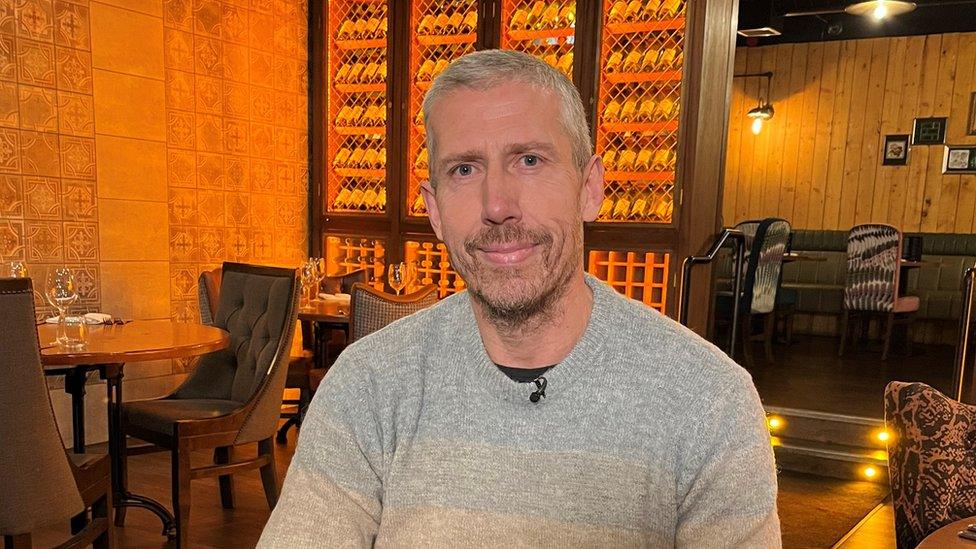
Restaurateur John Trainor says his staff will struggle to get to work
John Trainor, owner of Stix and Stones restaurant in Belfast city centre and the Balmoral Hotel in the west of the city, said 40 customers had cancelled bookings for Friday night.
"We expect another rush of cancellations as the days goes on."
Mr Trainor said his staff would struggle to get to work on Friday - but is sympathetic to the transport workers "who do a good service".
"The secretary of state has said he has no influence on this and I don't buy that. He has made decisions over the last while, especially around the [police] chief's constable's appointment" he said.
He is worried further strike action could cause additional disruption to his business.
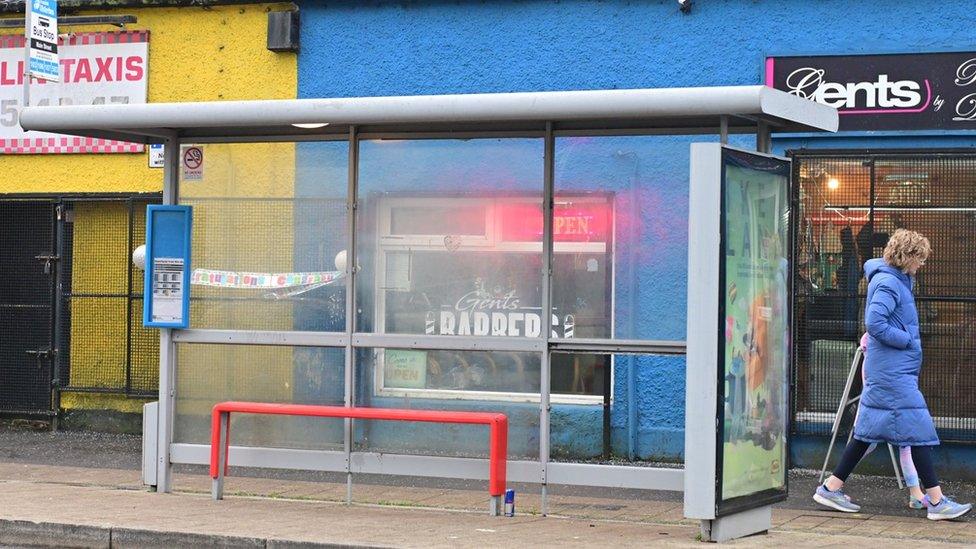
Some traders say business has suffered as a result of the strike action
"Most of the bookings are on a Friday or Saturday... if this happens again it will have a double effect on us."
Rosaleen Stewart, who runs Rosie's Emporium in Lisburn said her business would be "hit hard" by the strike.
"Myself and other retailers bring in more staff for the run-up to Christmas and we are potentially going to have no customers to serve, or very few," she said.

On the ground: Rory O'Reilly, BBC News NI reporter in Belfast
Belfast city centre was noticeably quiet during this morning's rush hour as Translink's 24-hour strike got under way.
On Glengall Street, the gates to the bus centre were shut and about 15 members of Unite, GMB and SIPTU stood in solidarity in the cold.
Eamon Sturgeon, a bus driver for 22 years, said morale is as low now as it's ever been during his career, as colleagues struggle to balance their pay with the cost-of-living crisis.
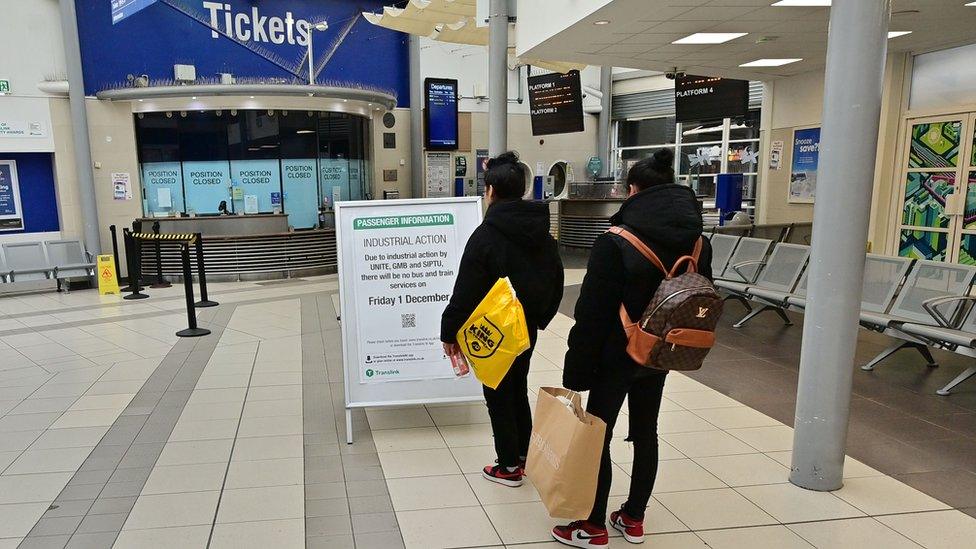
Passengers at Belfast's Great Victoria Street station were forced to make other plans
The strike is also having a knock-on effect for workers.
Lyndsey McAuley usually gets the train to Belfast from Carrickfergus but had to spend £25 for a taxi.
She says she doesn't have the extra money and if the strikes continue it would cause a loss of income.

On the ground: Julian Fowler, BBC News NI reporter in Enniskillen
The buses that normally carry hundreds of children to schools across Fermanagh are parked up at the bus depot in Enniskillen.
It is not only the 55,000 pupils who use Translink services that are affected.
Many of the EA yellow bus drivers are also on strike today, along with classroom assistants, kitchen and cleaning staff.
The EA normally takes 86,000 pupils to and from school but estimates the disruption to transport will impact more than 57,000 children and young people.
That means a second day off school this week for many pupils following industrial action by the teaching unions on Wednesday.
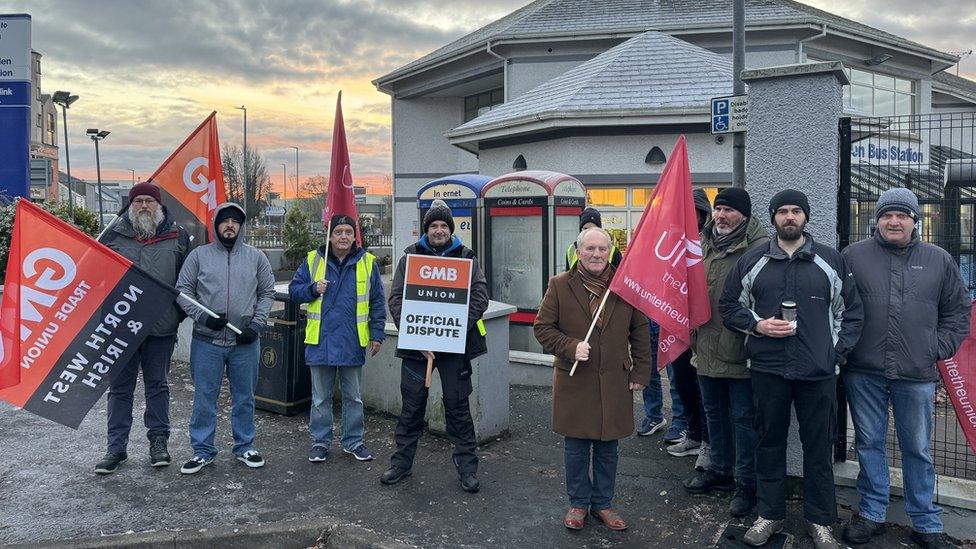
GMB and Unite members joined a picket line in Enniskillen

Budget challenges
Translink's Ian Campbell told Good Morning Ulster that the transport provider had "regular engagement" with the trade unions but emphasised that "this year Translink has had no budget allocation for pay".
He said: "We continue to engage right across government in order to seek a resolution of the current budget underfunding position which would enable us to engage in meaningful conversations with our trade unions over pay.
"We'll only be satisfied when we see that the budget allocation changes and we're able to resolve this current impasse."

On the ground: David Wilson, BBC News NI reporter in Londonderry
On any other day Londonderry's Foyle Street bus depot is a hive of activity. Not today. Foyle Street is unusually quiet.
There's no school pupils, no city centre workers or Christmas shoppers getting off buses that, on any other day, come and go from the city centre depot.
Instead, a few bewildered would-be passengers who are unaware of the strike, ponder their next move.
Cahill has bussed it from Buncrana in County Donegal hoping to travel onto the city's airport and fly to Manchester. Now, he says, he'll "have to fork out for a taxi".
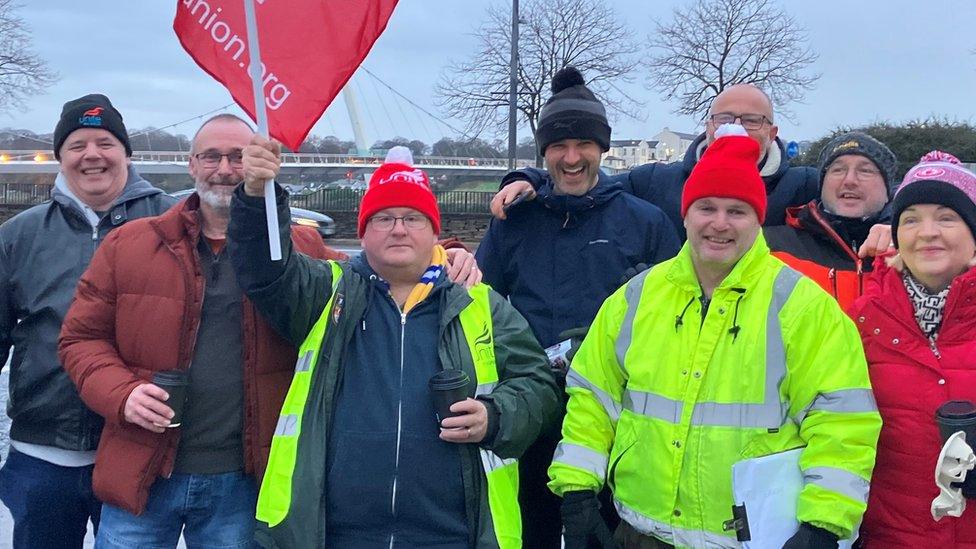
About 20 workers are on the picket line at Foyle Street in Derry
About 20 striking workers are at the depot's main gate. More colleagues are on the picket line at the depot in Pennyburn.
At Foyle Street, union members say they are undeterred by the sharp bite of a cold morning.
Mickey Morrison, a member of the Unite trade union, is among those on the picket line.
"We are sorry for our passengers, but we have been left with no other option," he says.

An NIO spokeswoman said that "the UK government has no authority to negotiate pay in Northern Ireland" and that was for the relevant Northern Ireland departments.
She added: "It remains the secretary of state's priority to see the return of locally elected, accountable and effective devolved government, which is the best way for Northern Ireland to be governed."
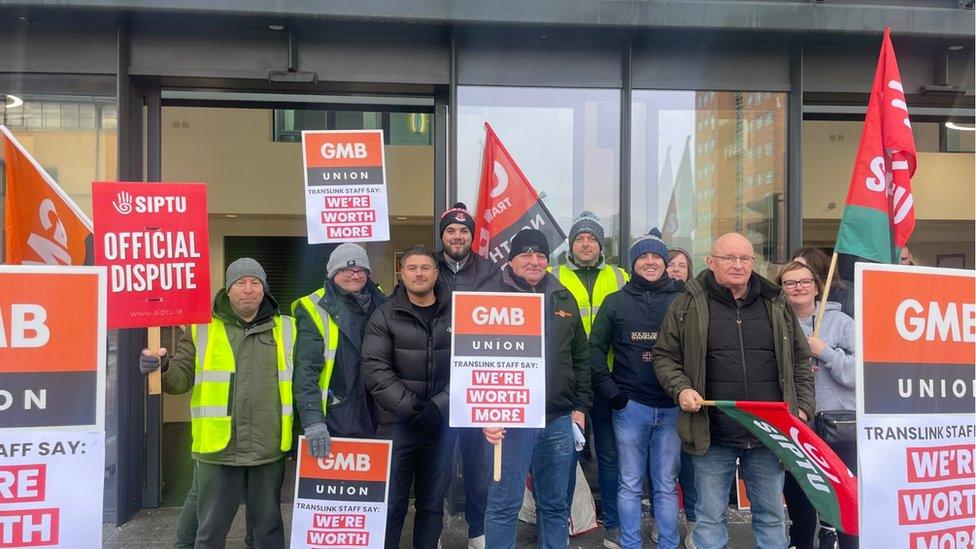
Striking workers at Lanyon Place, Belfast on Friday morning
She said that Chris Heaton-Harris had commissioned information and advice from the Northern Ireland Civil Service on "potential measures to raise more public revenue, or otherwise to improve the sustainability of public finances in Northern Ireland, for an incoming Executive to consider."
Due to the industrial action, there are no Nightmover services on Friday night into Saturday morning but they will be operational again on Saturday night into Sunday morning. Some adjustments to late night cross-border bus services are also expected before midnight Friday, when the strike ends.
Passenger information can be found on the Translink website, external, on social media, in stations and on buses and trains.
Related topics
- Published1 December 2023
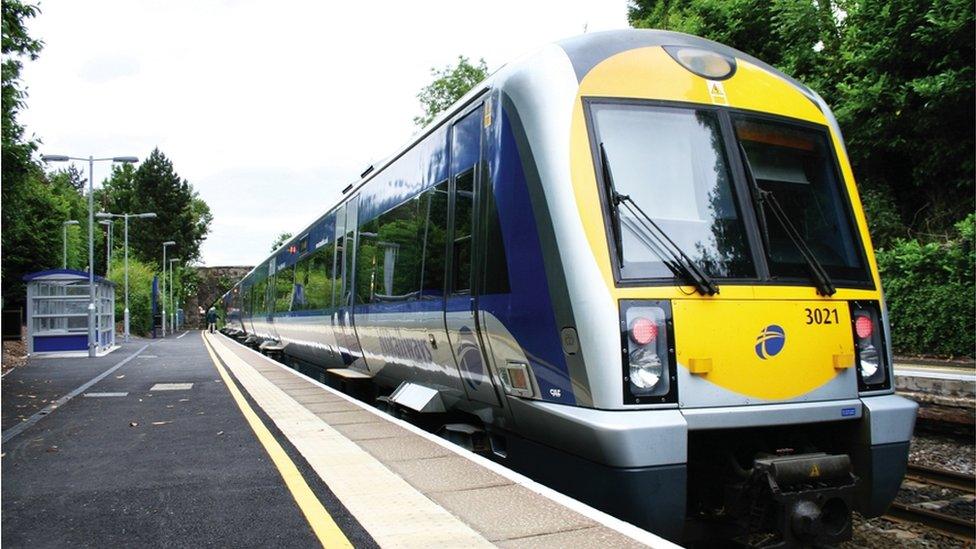
- Published22 November 2023
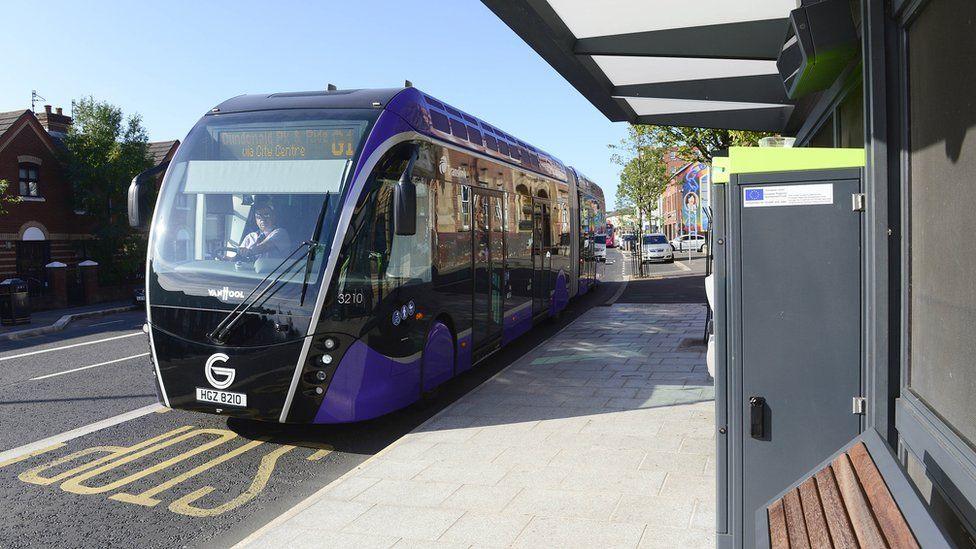
- Published23 November 2023
